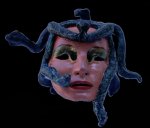
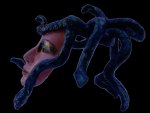
" Medusa
"
Papier mache
and acrylic
© 1979
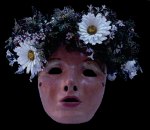
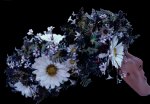
" Daisy
"
Papier mache, acrylic
artificial flowers
© 1988
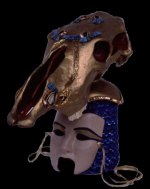
" Hathor "
Papier Mache, acrylic,
glass stones
and beads,
fabric
© 1990
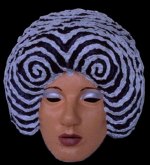
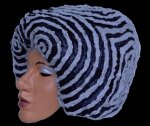
" Cho
Cho San "
Papier Mache, acrylic,
diamond dust
© 1981
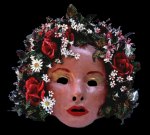
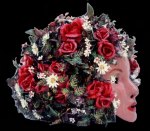
" Rose
"
Papier mache, acrylic
artificial flowers
© 1988
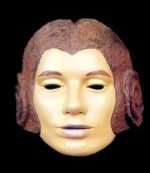
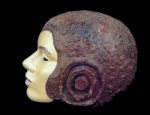
" Guadalupe
"
Papier mache,acrylic,
diamond dust
© 1979 |
When I am alone in the studio and no deadlines loom, when I can work slowly,
and let the process be a meditation, I frequently make masks of women. The
medium and process I use for these masks is a very slow one, very quiet,
very repetitive, with none of the movement and energy of making paintings
and sculpture.
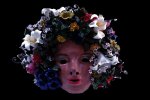 |
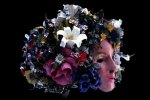 |
" Lily
"
Papier mache, acrylic and artificial flowers
© 1979 |
As a result, each of these masks was executed over a long period of
time. These masks were left on a bench, unfinished, sometimes for years at
a time. I only returned to them when time was my very, very own, full of
a longing for escape into the nothingness of deep meditative
process.
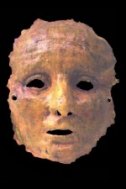 |
Everywoman
Papier mache and acrylic
© 2000 |
In my studio at present, three unfinished masks sit: one of Lilith;
one of an imagined woman I call Everywoman, whom I am designing as a character
for a performance piece I am writing, and yet another. I am not working on
them at present, as I am engrossed in painting and also wish to make some
totemic sculptures. Nonetheless, these masks sit on their bench, and greet
me and keep me company every day as I work.
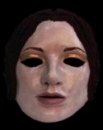 |
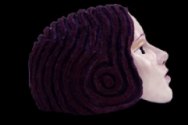 |
"
Fátima "
Papier mache, acrylic and diamond dust
© 1979 |
I cannot imagine being in my studio without unfinished "Women" masks in process.
Their presence in my studio is absolutely necessary for my work. Why is this?
I'm not sure, perhaps it is an affirmation of myself. And, while it is perhaps
quite ostentatious to place the wonderful, magical words of Joseph Campbell
beside this work, I will fulfill a dream and do so. As I work on these masks,
sometimes I try to understand or at least intuit the full depth and scope
of woman as she has been understood and misunderstood by our adored opposite
gender.
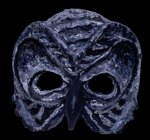 |
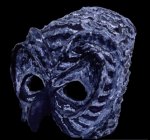 |
" Lilith
as Her Owl "
Papier mache and acrylic
© 1986 |
When I approach despair, and wonder how we could be so misunderstood, I think
of these words of Joseph Campbell, and I feel the rush of soft femininity
between my legs, and my face flushes with happiness that this man did indeed
understand.
"Woman, in the picture
language of mythology, represents the totality of what can be known. The
hero is the one who comes to know. As he progresses in the slow initiation
which is life, the form of the goddess undergoes for him a series of
transfigurations: she can never be greater than himself, though she can always
promise more than he is yet capable of comprehending.
She lures, she guides, she
bids him burst his fetters. And if he can match her import, the two, the
knower and the known, will be released from every limitation. Woman is the
guide to the sublime acme of sensuous adventure. By deficient eyes she is
reduced to inferior states; by the evil eye of ignorance she is spellbound
to banality and ugliness. But she is redeemed by the eyes of
understanding.
The hero who can take
her as she is, without undue commotion but with the kindness and assurance
she requires, is potentially the king, the incarnate god, of her created
world."
Joseph Campbell,
from " The Hero with a Thousand Faces "
|



















